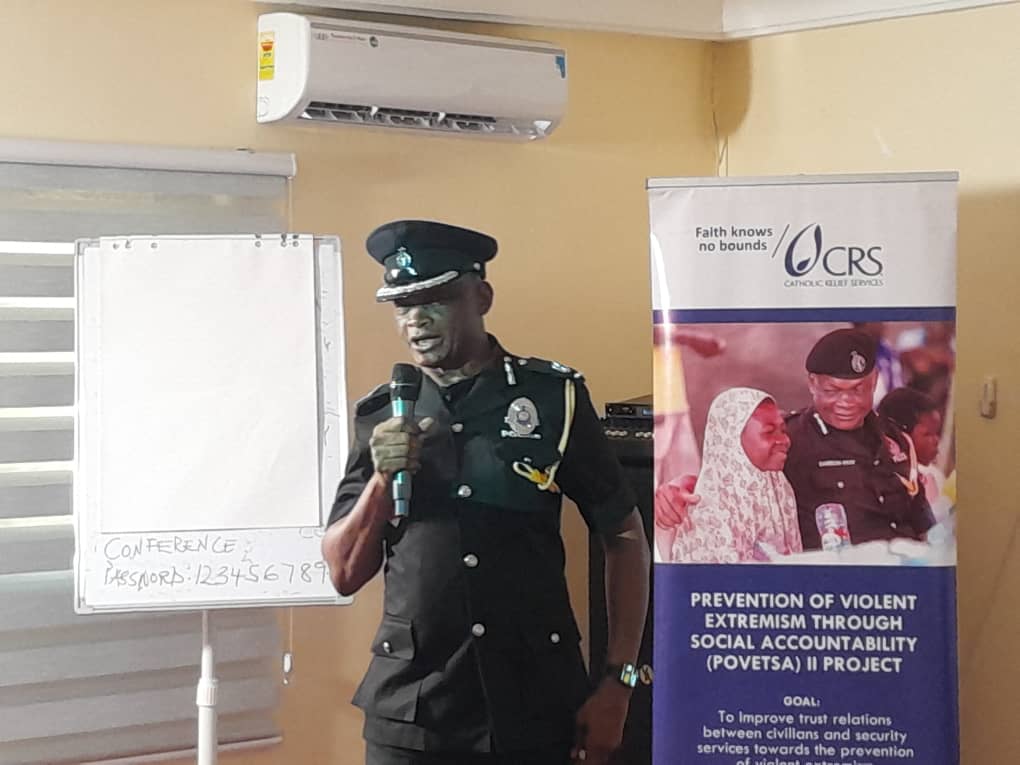The Ghana Police Service cannot maintain a presence in every community, making civilian participation essential to preventing violent extremism and maintaining security, a senior police commander said during a youth training session in the Upper East Region.
ACP Joseph Darison Wusi, Deputy Upper East Regional Commander, told 40 young participants that security is fundamentally “a shared responsibility” requiring active community involvement, particularly as threats of extremism loom from Ghana’s northern borders.
“If you look at the UN standards, we haven’t reached there at all. So we can’t police all communities,” ACP Wusi said during the two-day training organized by Catholic Relief Services and partners under the Prevention of Violent Extremism through Social Accountability (PoVETSA) Phase II project.
“You may go to a very big community, you won’t find any police post there. So what do we do? The community members have to assist the police in maintaining law and order in that area.”
The frank acknowledgment of resource limitations comes as Ghana works to prevent the spillover of violent extremism from the Sahel region, where neighboring Burkina Faso faces ongoing attacks, and countries including Benin, Côte d’Ivoire, and Togo have experienced incidents.
PoVETSA, implemented by Catholic Relief Services in partnership with the National Peace Council and Kofi Annan International Peacekeeping Training Centre and funded by the Kingdom of the Netherlands, operates across five northern regions—Upper East, Upper West, North East, Northern, and Savannah—addressing root causes of radicalization including youth unemployment, marginalization, political intolerance, and farmer-herder conflicts.
ACP Wusi outlined the Neighbourhood Watch Committee concept as a critical bridge between police and communities. These youth groups, comprising carefully vetted individuals with clean criminal records, receive police training to serve as the eyes and ears of law enforcement in areas without permanent police presence.
“The community leader, the traditional leader will identify some personalities, not just anybody. One who must be very disciplined,” Wusi explained. “We the police will take you through the criminal check record, whether you have committed a crime before or not. If you’ve committed a crime before, we’ll have you in the data and then we’ll remove you. Those who are clean, we train them.”
These trained community members receive identification cards and work alongside police to gather intelligence on potential threats, including terrorist activities, criminal gangs, and other security concerns. “That’s where you get the intel of whether terrorists are coming. You look out for some of these things, whether criminals come around or robbers, and report to the police and together we’ll ensure that there’s security in that area,” he said.
ACP Wusi’s emphasis on community partnership reflects a core principle of PoVETSA: that trust between civilians and security agencies is essential for effective prevention of violent extremism. “When there is mutual trust, civilians are more likely to cooperate with security agencies” in reporting suspicious activities, according to project documentation.
ACP Wusi also sought to demystify the police organizational structure, explaining that citizens have multiple access points for assistance—from street-level officers to police posts, stations, district headquarters, regional offices, and ultimately the Inspector General of Police at headquarters.
“At any of these levels, if you have a case where the policeman you are not sure, or at the station you are not sure you have been handled well, you go to the next level,” he said. “You don’t need to worry, just walk in. I want to talk to the regional head, the district commander, they’ll give you audience and they’ll address your concerns.”
This accessibility is crucial for building the trust necessary for community members to serve as partners in policing. ACP Wusi acknowledged that police personnel often develop friendships within communities, facilitating information flow and cooperation.
The PoVETSA project extends beyond youth training to include comprehensive interventions: training 150 security personnel from the Ghana Armed Forces, Police Service, Immigration Service, National Intelligence Bureau, Fire Service, Prisons Service, and NACOC on human rights-based conflict management and the “Responsibility to Protect” doctrine; conducting regional stakeholder dialogues to build civilian-security trust; implementing women’s empowerment programs recognizing their critical role in community resilience; and training journalists on preventing violent extremism.
The project’s three-level prevention strategy addresses long-term governance and economic factors, provides real-time crisis relief, and builds post-crisis resilience and stability.
For the 40 youth participants in Bolgatanga, the training represents an opportunity to become what PoVETSA terms “peace champions”—community members equipped to detect signs of radicalization, facilitate dialogue between civilians and security forces, and serve as early warning sentinels in the fight against violent extremism.
“The singular reason for establishing the police organization in any corner of the world” is “to prevent occurrence of crime,” ACP Wusi said, adding that preventing violent extremism falls squarely within this mandate—but one that cannot be achieved by police alone.
Source: a1radioonline.com|101.1Mhz|Mark Kwasi Ahumah Smith|Bolgatanga


